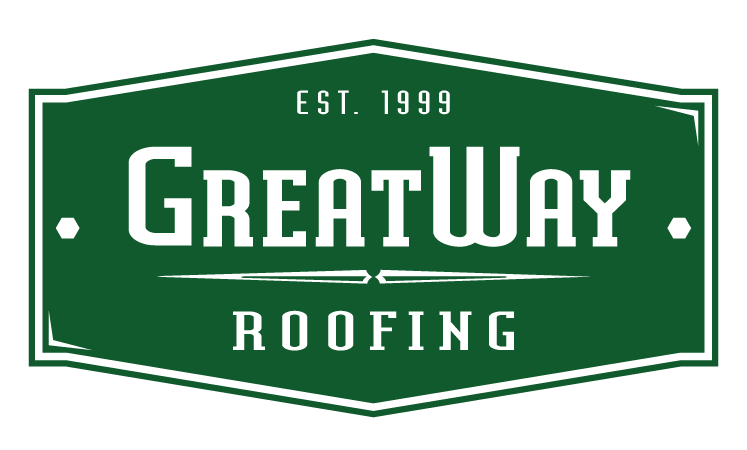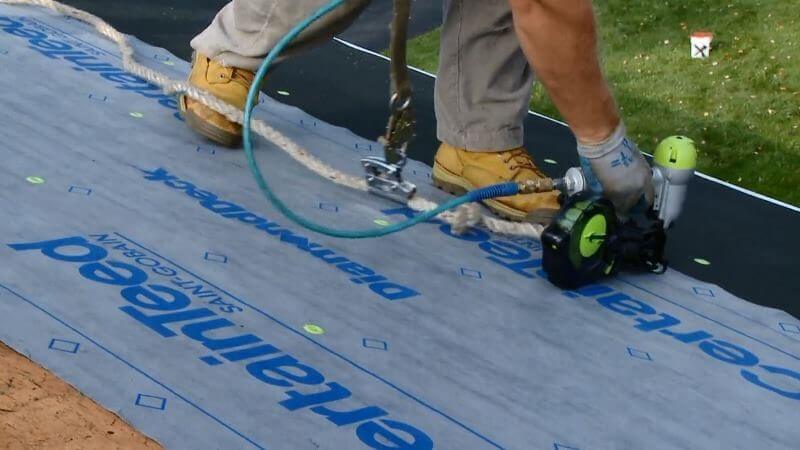If you’re thinking of installing a new roof, one of the first things to ask when working with a contractor is what type of underlayment they will be installing. You may be wondering, “What is underlayment, and why is it important?” Underlayment is the waterproofing material or membrane installed underneath your shingle or tile roof. There are two types of materials used today–felt and synthetic underlayment.
Felt underlayment is made up of cellulose, polyester, bitumen, and asphalt. Felt is available in two thicknesses: fifteen-pound and thirty-pound. Thirty-pound felt is thicker and stiffer than fifteen-pound, so thirty-pound is more resistant to damage during installation and can protect the roof longer if exposed to outside elements like wind, rain, or snow.
Synthetic underlayment is typically made from woven or spun polyethylene or polypropylene, and it comes in a variety of different thicknesses to suit your needs. These usually weigh less than traditional roofing felt, and many products have layered designs.
Besides being different materials, you may also be wondering how they differ in performance and what pros and cons each have. This article will provide some insight into this matter to decide which option is best for your new roofing project.
Some Facts About Synthetic and Felt Roofing Underlayment
Many factors will determine which types of underlayment you should use. One of the most significant factors is whether the roof is synthetic or felt.
Let’s take a look at some of the key differences between synthetic and felt roofing:
- Synthetic underlayment is stronger, and longer-lasting than felt. Therefore, can protect your roof for decades without requiring replacement.
- Synthetic underlayment can stand up better to high winds giving you peace of mind.
- Synthetic materials are more durable than felt as they have less degradation over time.
Each material has its own advantages and disadvantages, but when you’re looking at what material to use on your new home or commercial building, be sure to consider the differences.
Which Roofing Option is Best for You?
Maintenance: One of the most important things to consider when choosing between the two materials is how much maintenance they require. Synthetic underlayment is less complicated than felt, which means it will require less maintenance. In contrast, felt may need more attention because it can be easily damaged by sharp objects, high winds, or foot traffic.
Durability: Another essential factor to consider is how long each type of material lasts. Synthetic underlayments are more durable than felt underlayments, providing a longer life span for your roof system, as well as fewer leaks and better resistance against damage from fire and water.
Additionally, synthetic underlayments are much more tear-resistant when exposed to high winds and foot traffic. On the other hand, felt underlayments are more flexible and can be more easily replaced, but they can tear and rip more easily during installation, as well as during weather events, leaving the roof exposed.
Installation Time: Synthetic underlayment also requires less time to install than felt does. It’s easier to work with and less likely to tear.
Cost: The difference in the initial cost isn’t significant between felt and synthetic underlayments. Felt costs a tad bit more at approximately $15 per 100 square feet, whereas synthetic underlayment is roughly $12 per 100 square feet.
Synthetic and Felt Underlayment Conclusion
Synthetic and felt underlayments work effectively to protect your roof from exposure to the elements. Still, both have their pros and cons regarding durability, maintenance, installation time, and cost. Also, keep in mind that not all synthetic underlayments are the same. Check with your roofing contractor to ask about the manufacturer and if it’s made in the USA. After reading this, you should have a solid understanding of the pros and cons of felt vs. synthetic underlayment.
Greatway Roofing has over 20 years of experience as the leading Santa Clarita Valley, San Fernando Valley, and Ventura County roofing company. We offer free, comprehensive estimates, and our workmanship is fully guaranteed. Talk to one of our friendly team members today at (805) 523-2550.

